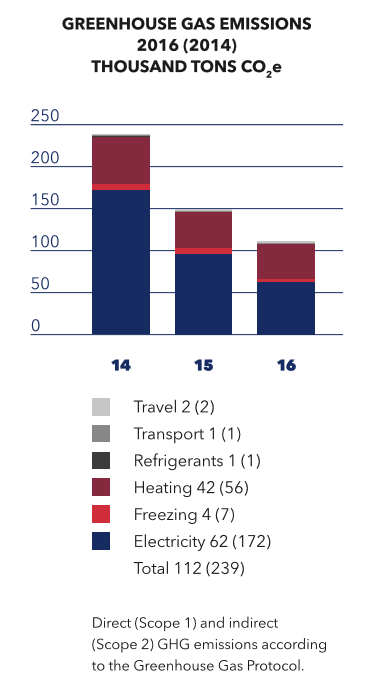In 2016 HKScan achieved a 53% reduction in the Group’s emissions of greenhouse gases compared to the baseline level of 2014.
“In 2015, we reduced emissions by 37 per cent from the 2014 level, and in 2016 further improvements led to a reduction of 53 per cent from 2014. In total, we have cut CO2 emissions by 127 thousand tonnes a year. This is a significant achievement in only two years,” says Vera Söderberg, HKScan’s Corporate Responsibility Manager specializing in environmental affairs.
The biggest improvement achieved in 2016 was a reduction in indirect (Scope 2) emissions, such as purchased electricity and district heating, largely thanks to the Group’s switch to bio- and hydroelectricity in Finland, which resulted in a reduction of 30 thousand tonnes. Energy efficiency and lower emissions from freezing also reduced emissions in 2016.
“We are happy with our efforts to mitigate our impact on climate change, but our work cannot stop here. HKScan is continuously adopting more renewable energy sources, like district heating from renewable sources, biogas, wood pellets and wood chips. We have identified further mitigation potentials for the coming years, such as the use of biogas at our sites and further energy efficiency measures,” adds Söderberg.
In addition to achieving emission reductions, HKScan has also offset its Scope 1 and Scope 2 GHG emissions from Finnish production sites by supporting a deforestation prevention project in Southern Africa. The emissions generated in 2016 by Finnish plants will be offset by the planting of trees in valuable forests in a location heavily impacted by climate change. Our highest priorities are actions reducing our overall emissions, but we also recognize that not all emissions can be avoided today, and thus offsetting was seen as the best alternative to mitigating the impacts of HK and Kariniemen brand products,” says Martin Aalto, Energy and Environmental Engineer at HKScan Finland.
Environmental work is part of strategic development
“Environmental responsibility is a continually growing demand among HKScan’s stakeholders. Customers, consumers and shareholders alike are evaluating companies for their environmental agenda and making conscious choices based on their environmental performance. We know that meat production causes GHG emissions and by mitigating them we not only want to increase trust in our responsible brand portfolio, but also ensure that consumers and customers are able to make better informed choices and will enjoy our locally produced meat both today and tomorrow,” says Aki Laiho, EVP Operations.
Reduction of GHG emission contributes to the global and national targets as defined under the Paris Agreement. Energy efficiency moreover contributes to substantial cost savings, the same is commonly valid for transition to renewable energy even though further development is needed in our operating countries.
The Group has been measuring its emissions of greenhouse gases in line with the Greenhouse Gas Protocol (GHG Protocol) since 2014. This is the global standard most widely used for quantifying, managing and reporting emissions of greenhouse gases.

Scope 1 relates to greenhouse gas emissions from sources owned or controlled by the company. These include emissions from oil burners and the company’s own vehicles. The indirect sources defined in Scope 2 include the company’s consumption of purchased electricity, steam and district heating.
Scopes 1 and 2 account for less than ten per cent of total greenhouse gas emissions from meat production, from farm to fork (i.e. emissions from HKScan’s commercial activity). Scope 3 (i.e. the value chain of activities before and after HKScan’s commercial activity) accounts for over 90 per cent. Animal primary production is the biggest source of emissions in Scope 3. In order to assess products from a life cycle perspective (and partly emissions under Scope 3), HKScan uses life cycle analysis (LCA) to measure various environmental aspects.
Scope 1 and Scope 2 emissions from HKScan production sites in Finland have been offset by purchasing and retiring carbon credits from the Kariba REDD+ Project (project ID: 100000000001275). The public retirement statement can be found here. The offset emissions has not been withdrawn from the total emissions of HKScan, and thus does not affect the result of the 53 % reduction.
For further information:
- Vera Söderberg, Corporate Responsibility Manager, HKScan Corporation
- Martin Aalto, Energy and Environmental Engineer at HKScan Finland
- Kindly submit a callback request via Marja Siltala, VP Communications, HKScan Corporation, tel. +358 10 570 2290 or marja.siltala(at)hkscan.com
HKScan is the leading Nordic food company. We sell, market and produce high-quality, responsibly-produced pork, beef, poultry and lamb products, processed meats and convenience foods under strong brand names. Our customers are the retail, food service, industrial and export sectors, and our home markets comprise Finland, Sweden, Denmark and the Baltics. We export to close to 50 countries. In 2016, HKScan had net sales of nearly EUR 1.9 billion and some 7 300 employees.




